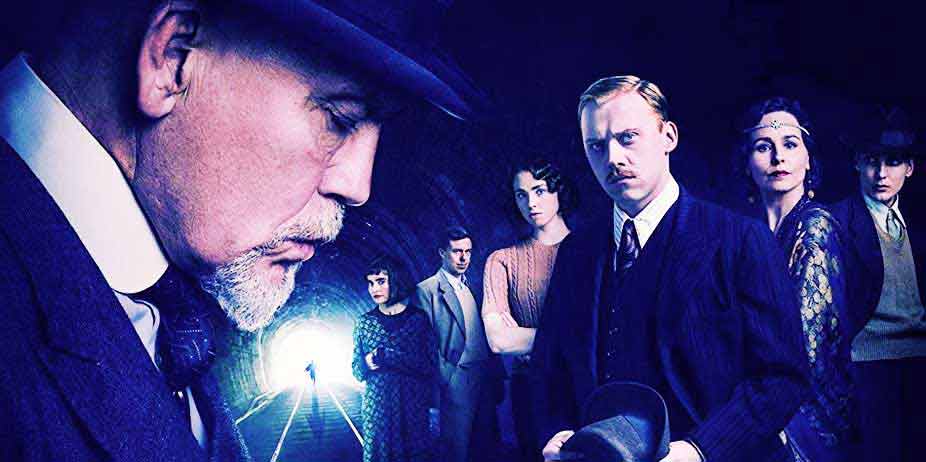
The ABC Murders (2018)
Hercule Poirot is a household name.
With dozens of books about him, and a twenty-year series
starring David Suchet, the BBC had an uphill battle to
“re-imagine” him for one of Agatha Christie’s most
famous mysteries. The result does not feel like Poirot,
but is a decent mystery on its own terms.
Since his good friend Inspector
Japp retired, Scotland Yard no longer has any interest
in using the Belgian detective Poirot (John Malkovich)
to solve crimes. Forced into his own retirement as a
result, Poirot spends his days in bored idleness until a
mysterious string of letters arrives in the post. The
local inspector (Rupert Grint) dismisses them as
nonsense, but Poirot senses an unseen pattern and a
threat. And when a dead woman turns up in an A-town,
with A-initials, Poirot believes a serial killer is
trying to entice them into a game of cat and mouse.
The story unfolds with strife
between Crome (Grint) and Poirot, as they come to terms
with trusting each other, and also follows the sinister
story of a young pantyhose salesman, Cust (Eamon Farren),
who wanders near all the victims. It’s an engaging and
twisty tale with a lot of interesting side characters;
the audience is never sure who to trust or distrust, and
the series effectively gives out a lot of red herrings.
The strongest thing it offers is the distrust between
Crome and the brilliant detective. With Japp out of the
picture and Hastings nowhere in sight, Poirot has no
allies and must earn the respect of a younger, skeptical
man. How they come to terms with each other is a moving
part of the story, which also peers into Poirot’s tragic
past and reveals his life before he immigrated to
England.
Packed into the story is a
political statement about allowing in refugees, since
everyone distrusts Poirot because of his accent. This
Poirot bears no resemblance to Agatha Christie’s fussy,
self-important sleuth. He’s reserved, withdrawn, broody,
preoccupied with his past and his faith, and has no ego
apart from his desire to appear younger by blackening
his goatee. Malkovich is good at introspective acting,
but his Poirot is bland. Gone is the author’s humor in
which she pokes fun at her absurd detective, leaving
only a dramatic piece. It’s a solid three-hour mystery,
well-acted and costumed, with a terrific musical score,
plenty of twists and turns, and a good cast, but... why
call it Poirot if he... isn’t?
Sexual Content:
A man overhears sexual sounds from the apartment above
twice; he pays a woman to stand on his back and grind
her broken heel into his open wounds to relieve a
medical condition (the scene leads us to believe a
sexual encounter is about to take place); a man walks in
on a woman in the bath and takes away her towel (we see
nothing); a woman sexually teases men, talks about them
being a virgin, and flashes them her legs; it's implied
a woman has spent the night with a man; a woman pimps
out her daughter to her male tenants.
Language:
Uses of 'bastard,' 'bloody,' and other British slang;
one f-word.
Violence:
Murders are never explicitly shown, just the bloody
aftermath of strangulations, slit throats, and blood
spattered across the pages of railway guides; a person
is struck over the head; another person falls and breaks
their ankle; a woman dashes wine into another woman's
face; flashbacks to a church burning and people being
shot in WWII.
Other:
The script turns Poirot into a persecuted immigrant to push
a political agenda.
